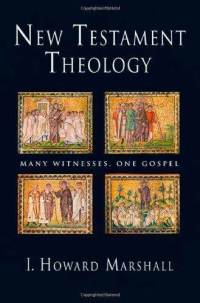 I. Howard Marshall's chapter on Acts in terms of Dogmas, Doctrines, Distinctives, and Details.* Dogmas. Marshall affirms all the central beliefs of Acts, starting with the Gospel message (155), which can only positively be responded to with repentance and faith for the forgiveness of sins (176) “expressed in submission to baptism” (181). The Trinity is emphasized, even though it is not specifically labeled as such (161). Furthermore, the exclusivity of Christ is strongly emphasized, so that not even Judaism is enough (161) stating that “Nobody else or nothing else can save, and no supplementation or prior conditions are needed” (164). Marshall also denies works righteousness, that keeping the Law can't save for salvation is by grace/faith (163). Marshall even touches on the Gospel in light of those who've never heard, stating that God “...has appointed the life of the nations in such a way that people should be able to find him without falling into idolatry” (167). Most impressively, Marshall places the Mission of God right where it belongs, as the center of theology and the key to Redemption History. He begins by showing how the Great Commission is the continuation of God's Mission through the Church (156), which is Dogma because without it the propagation of the mission would have failed in the 1st Century). Thus, “salvation is made effective in people's lives through the preaching of his followers. Although Jesus is not physically present, his work goes on.” (160). In short, Acts is story of mission (162) and Christian preaching is the continuation of Jesus' activity and the witness to him in the Gospel (161). Marshall even takes an entire paragraph to promote the wider meaning of the word “Witness” since it is used for more than strictly eyewitnesses, such as Luke's use of it for Paul, thus showing it is applicable to everyone who “proved for themselves the reality of salvation (180). Marshall also addresses Adoptionism and other false Christologies (175). Doctrines. Marshall hits on contextualization issues in the Gentile/Jewish debate stating that Gentiles are not forced to conform to the Jewish model since “whether Luke's view is that Jewish Christians should [go on living in their traditional ways] or must to continue to live in his way is a moot point.” (164). The only uniformity he points out is the reality of suffering for being a Christian (168). Shockingly, Ecclesiology receives little attention for a review of Acts. The Church as the main vehicle for God's mission is grasped (179) including that churches should follow Paul's model in his missionary work (167). Marshall seems to take stab at Baptismal Regeneration with the inclusion of the story of Apollos who was fervent in spirit with no indication of Christian baptism (167). Marshall maintains the historicity of the Acts, but sadly seems to question some details (157). Distinctives. Marshall seems to largely discredit Dispensational theology stating that “[Luke] comes dangerously close to suggesting that it is only when and because the Jews reject the gospel that the missionaries turn to the Gentiles.” (166). Instead, a Jewish priority, but Gentile replacement of unbelieving Jews is the case “without implying that [Gentiles] will be evangelized only if the Jews disbelieve” (166). This concept may be worthy of Dogma if Dispensationalism denies the Mission of God to save all people. Marshall also strongly denounces a determinism (against Reformed theology) in Acts (171). Charismatic gifts are covered, but he does not make a strong stand for or against their continuation. The only clue may be in his enigmatic phrase: “It would also seem that early Christians did experience phenomena that were understood to be indicative of the presence of the Spirit” which could indicate a cessationist position, or an elusive answer to a naturalistic academic audience. Plus, he does support the gift of the Holy Spirit at Salvation over-against Baptism of the Spirit (177). Ecclesiology is relegated almost solely to Israel vs. the New Israel (178), with no mention of the marks of the Church, etc.. Church governance is appropriately placed as a distinctive with a single dismissive sentence (179) while also denying a central authoritative church system (180). Details. Circumcision is a Jewish Identity marker and not required for salvation (162).
*Dogmas are theories directly impacting God's mission to reconcile all people to Himself (orthodoxy & orthopraxy required).
Doctrines indirectly impact God's mission (and are thus vitally important), but people can fail to interact with or understand them accurately (essential to orthodoxy, not orthopraxy). Distinctives don't affect the orthopraxy of salvation, but will impact the orthopraxy of a church. Details have little to no effect on orthodoxy or orthopraxy.
0 Comments
Leave a Reply. |
AuthorBrett Yardley: Categories
All
Archives
January 2019
|

